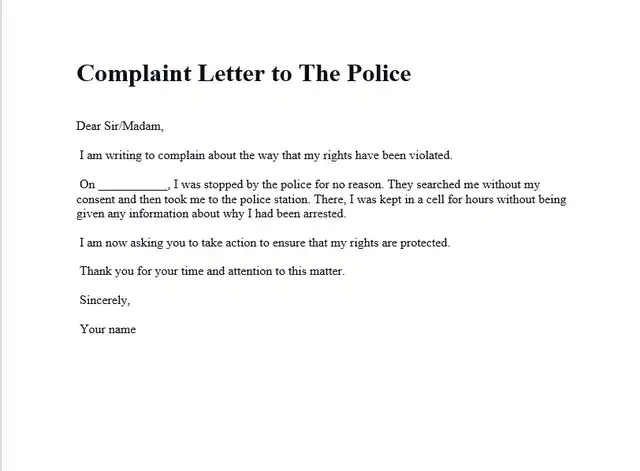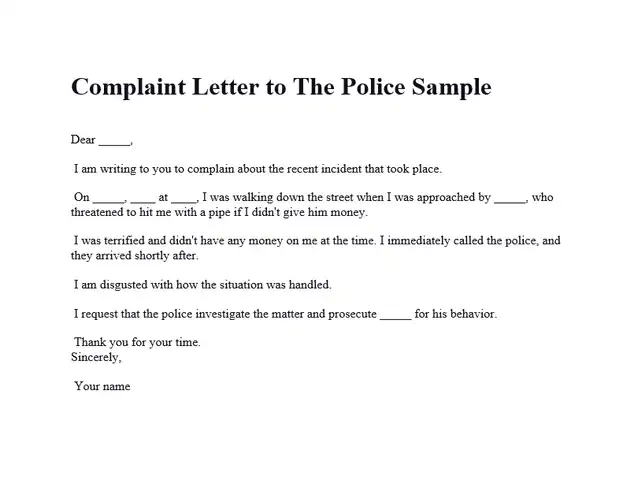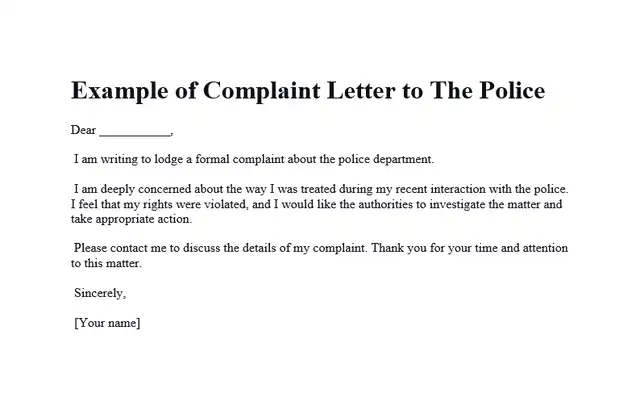If you have ever had a problem with the police, there is a good chance that you have written or emailed them. But do you know how to make your letter resonate? This blog post will outline tips for writing a complaint letter to the police that will help you get the desired results.
Table of Contents
What Should Include On complaint letter?
A complaint letter to the police should include the following:
- Your full name
- Your address
- The date of the incident
- The time of the incident
- Description of the incident
- Names of any witnesses
- Your phone number
- A statement of the facts of the incident
Include the following in your letter if possible:
- A written statement from the victim
- Photos or videos of the scene
What do you want the police to do about the incident?
- If you want the police to investigate the incident, include your name, address, and phone number.
- If you want the police to take action against the people who committed the act, include their full names and addresses.
- If you want the police to provide you with a police report, include your name, address, and phone number.
- If you want the police to provide you with a security guard for your event, include their name, address, and phone number.
What are the benefits of filing a complaint letter to the police?
The benefits of filing a complaint letter to the police may include the following:
- increased chances of solving a crime
- increased confidence in the police
- increased trust between the police and the community
- increased awareness of police services and activities
Complaint Letter to the Police
A complaint letter to the police is an important document that should be written as soon as possible after an incident occurs. This letter should outline what happened, what was said, and what witnesses can be found. The letter should also be signed and dated by the complainant.
Complaint Letter to The Police

Complaint Letter to The Police
Dear Sir/Madam,
I am writing to complain about the way that my rights have been violated.
On ___________, I was stopped by the police for no reason. They searched me without my consent and then took me to the police station. There, I was kept in a cell for hours without being given any information about why I had been arrested.
I am now asking you to take action to ensure that my rights are protected.
Thank you for your time and attention to this matter.
Sincerely,
Your name
Complaint Letter to The Police Sample

Complaint Letter to The Police Sample
Dear _____,
I am writing to you to complain about the recent incident that took place.
On _____, ____ at ____, I was walking down the street when I was approached by _____, who threatened to hit me with a pipe if I didn’t give him money.
I was terrified and didn’t have any money on me at the time. I immediately called the police, and they arrived shortly after.
I am disgusted with how the situation was handled.
I request that the police investigate the matter and prosecute _____ for his behavior.
Thank you for your time.
Sincerely,
Your name
Example of Complaint Letter to The Police

Example Complaint Letter to The Police
Dear ___________,
I am writing to lodge a formal complaint about the police department.
I am deeply concerned about the way I was treated during my recent interaction with the police. I feel that my rights were violated, and I would like the authorities to investigate the matter and take appropriate action.
Please contact me to discuss the details of my complaint. Thank you for your time and attention to this matter.
Sincerely,
[Your name]
How to Make a Complaint Letter to The Police
Whether filing a formal complaint or just voicing your concern, following these guidelines will help make your letters more effective and satisfying for you and the police department involved.
Start by writing a thoughtful introduction.
A complaint letter to the police is a common way to voice concerns and get help. However, writing a letter that resonates with the police takes time and effort.
- To ensure your letter is successful, start by considering the context of the situation. This should include everything from what was wrong to why it matters to the author.
- Next, state-specific details about what was wrong without exaggerating or blaming others for the situation.
- Finally, be clear that you are not angry or hostile towards law enforcement and want their help resolving this issue. Doing these things will put your reader at ease and increase your chances of getting feedback or action from the police department.
Address the reasons for your complaint
A complaint letter to the police should always start with the reasons for the complaint. This will help make your letter resonate with the individual(s) you are writing it.
The following are a few reasons why someone might file a complaint:
- They feel unsafe, they have been harassed or discriminated against, their property has been damaged, etc.
- Your letter must address these issues specifically and honestly to build trust and credibility with the individual/s you are writing to.
- A complaint letter to the police should be clear and concise; this makes them easier for individuals to understand and follow. Make sure all of your points are covered concisely so there is no room for misinterpretation – try not to exceed one page in length!
- Keep your language polite and respectful – even if someone has wronged you, do not speak down to them or use aggressive words when communicating. Avoid personal attacks on either party involved, as this will only backfire.
Include specific details
When writing a complaint letter to the police, it’s important to include specific details. This will help your letter resonate with the officers on the receiving end and hopefully lead to a successful outcome.
Below are tips for creating an effective complaint letter:
- Be concise. Complainants who can succinctly state their grievances tend to have better luck resolving those who spend too much time discussing unrelated issues. Keep your letter focused on the issue and avoid rambling about irrelevant matters.
- Use polite language. You don’t want your words to anger or frustrate the officer you’re speaking with, so be respectful in your wording. Always use proper grammar and spelling and present clear sentences that flow easily from one sentence to another without jumbled-up punctuation or awkward word choices.
- Make sure you can identify yourself. When complaining about someone, ensure that you know their full name (including middle initial), badge number, precinct they work in, etc., so you can accurately address them by name when corresponding further.
Include any supporting evidence or documents
When you write a complaint letter to the police, it’s important to include any supporting evidence or documents to help make your case. This includes copies of receipts, screenshots of conversations, or emails related to the issue.
A concise and to-the-point letter is essential in clarifying your grievance and ensuring that the police understand what has happened.
While it’s not always necessary to go into great detail when writing a complaint letter, maintaining a polite tone will help ensure that you are heard and addressed as quickly as possible.
It can also prevent future conflicts from arising between both parties. Ultimately, resolving an issue as quickly as possible is key to preventing further damage from occurring.
Read Also: Complaint Letter for Poor Service: How to Write the Perfect Letter With 5 Powerful Tips
End with a summary, and thank you
A complaint letter to the police can be a frustrating experience, but with these tips in mind, you can produce a clear, concise, and persuasive letter.
Above all else, please keep the following points in mind: Thank the officer for their time and effort, Express your dissatisfaction succinctly, and Close with a summary of your issues and what you want the officer to do next. This guide has helped you write an effective complaint letter to the police.

